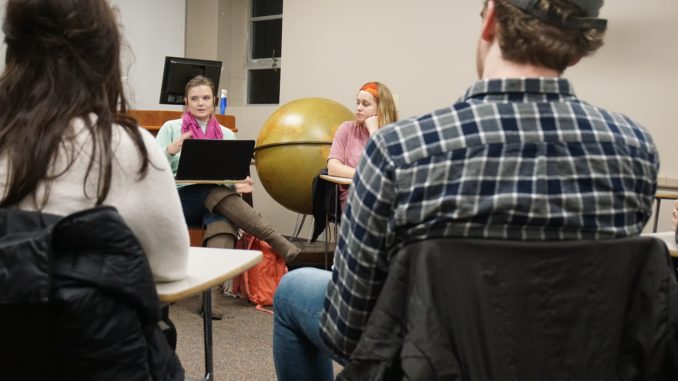
There are twelve official student led service organizations at Truman State University, and many more that do service as part of their activities, but senior sociology major Rachel Smith saw a gap in the existing system. Along with other students and faculty members, Smith decided to fill that gap, founding a new club for students interested in going into social work.
Smith said the club exists to offer resources and information about careers in the field to students who have an interest in social work. Because Truman does not provide a degree in social work, Smith said students who want to go on to get their master’s degree in the field are at a disadvantage. Smith said the club exists to try to neutralize that disadvantage.
“Our club is trying to give you some educational foundations and [help you] explore graduate opportunities, internship opportunities and that kind of thing before you really jump into a master’s program in the field without really knowing what you’re going to do,” Smith said. “We’re really trying to have people explore different field opportunities before they have to pick specializations within a master’s course.”
She envisions the club as something like a course to give students a preliminary education in social work before pursuing further education in the field.
Smith and the founding students and faculty started the club last semester, but because the chartering process is somewhat drawn out, the organization was unable to hold any meetings at that time. Many of the founding members of the club are close to graduating, so Smith said the members are currently trying to get together an officer board of underclassmen to keep the club going after the founding generation is gone.
Psychology lecturer Rebecca Zimmer is one of the faculty sponsors for the social work club. As a licensed clinical social worker herself, she found herself sought out by students who wanted to learn more about the field.
“[Social workers] look at not just the whole person, but the whole system that they’re involved in,” Zimmer said. “Their family, the community, the school…”
Students formed the club to improve the existing system at Truman. Zimmer and other faculty saw a gap in outlets for prospective social workers on campus and, in partnership with students, moved to fill it.
“That’s one of our ethical mandates, and something that we believe in … not just refusing to participate in systems that we don’t like but to try to become involved in the systems and make it more user-friendly and better for the people that are using that system,” Zimmer said.
Zimmer said there were a few different factors that contributed to the formation of the club. One of those factors emerged when Truman faculty noticed how a social work perspective would benefit an existing educational partnership between A.T. Still University and Truman. This program pairs pre-medical and service students with elders in the community to provide service and help for those citizens, utilizing the students’ specialties. Zimmer said the club offers a way to connect the students that come to her door with existing opportunities.
Zimmer added, “If you are going to be a social worker, advocacy is part of your ethical mandate, and so just bringing awareness and supporting activities that would focus on social justice here on the Truman campus would be another reason [for the club].”
Since social workers can fill a broad range of roles, having a network to explore those opportunities gives Truman students a better grasp of what social work is.
“Social workers work everywhere that people are,” Zimmer said. “There’s international social work, medical social work, school social work, really everywhere. Social workers work in all kinds of places. Anywhere where there’s people you will find social workers.”
Alumna Ashley Kuykendall graduated from Truman as a health science major in 2016 and is now at Washington University in St. Louis working toward master’s degrees in social work and public health. She offered some thoughts on how Truman prepared her for social work.
“I think the fact that Truman as a campus is so service oriented and really values people sort of made it a really natural transition [to social work],” Kuykendall said.
Kuykendall said even in health classes professors recognized the importance of discussing the entire lives of patients. She had some advice for Truman students interested in social work.
“I think my top recommendation is to be humble in that pursuit, and recognize that the purpose of social work is not to save people from themselves,” Kuykendall said. “The purpose of social work is to help to create systems that better serve the people who live in our communities … The second recommendation is to read a lot about other people’s perspectives, because I think in order to be good at social work, you need to understand where people are coming from and why things are the way they are.”
